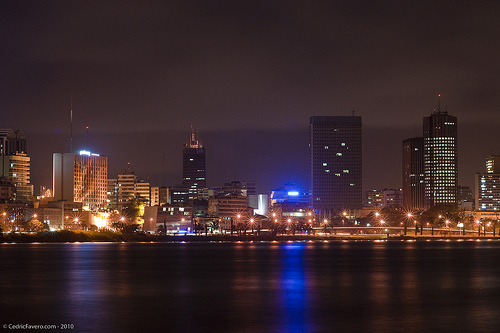City Profile: Abidjan, Cote d’Ivoire
This is the third post in a series that intends to examine the ICT environment in large metropolitan areas of Africa that receive relatively little publicity and lack ICT framework. These cities are often overshadowed by Cape Town, Johannesburg, Cairo, Nairobi, Accra, and Lagos but still have a bright future – albeit with a few additional hurdles to clear. We resume with Abidjan, Cote d’Ivoire, known as “The Paris of Africa”.
Cote d’Ivoire (Ivory Coast), located in West Africa, was on pace to develop a solid ICT foundation in the 1990’s. In fact, ICT plans had existed in some form since the 1970‘s! However, civil war disrupted the economy, along with infrastructure development and social reform, thus delaying Internet penetration. Still, with peacetime conditions and a supportive West African tech sphere, Cote d’Ivoire (and therefore Abidjan) is advancing. In the past 7 months, 15 visitors have come to this site from the city of Abidjan.
First, a look at the most recent population figures for Abidjan:
- 4.2 million (UN World Urbanization Prospects, 2009), other sources say 4.1-4.4 million
- 7th largest metropolitan area in Africa (second-largest in West Africa)
An in-depth search of the Internet turns up a limited number of ICT endeavors and reports from the past few years. The most notable event is BarCamp Abidjan, which took place a couple of months back. Most reports are outdated and focus on the country- rather than city-level, but here are some important points of information to know about Abidjan’s ICT progress:
Background:
- No Internet connection existed in 1995. In 1997, only 3,000 to 4,000 computers were sold in all of the Ivory Coast. 80% were bought by the government or private businesses. Internet cafes charged $7.50/hour, or $127/mo unlimited.
- Connected to SAT-3/SAFE. Slated to connect to Glo-1, WACS and ACE in 2010, 2011 and 2012, respectively, which will increase bandwidth capacity substantially. http://brough.typepad.com/.a/6a00d8341c398553ef01347fed535e970c-800wi
- 1998: ”The nearest Internet node is 4,200 miles away, and we are importing foreign know-how, so the cost to us is very high,” said Martial Nogbou, the commercial director of Africa Online, who defended his company’s pricing policies. ”I compare it to wanting to eat a typically Finnish diet in the middle of West Africa. Of course it is going to be expensive.” http://www.nytimes.com/1998/01/26/business/in-africa-reality-of-technology-falls-short.html?pagewanted=2
- Coup in 1999, conflict in 2004 between Christian government-controlled south (ie. Abidjan) and Muslim rebel-controlled north resulted in further conflict with France and thousands of Ivorians leaving the nation.
- Hopes were high in the late 90’s, with competition (between Africa Online, and at least 3 other ISPs) expected to reduce prices. Also, fixed lines were expected with investment from France Telecom. Dozens of other national organizations were involved in ICTs. http://banners.noticiasdot.com/termometro/boletines/docs/consultoras/aisi/2000/aisi_cote_ivoire.pdf
- Overview on past Cote d’Ivoire ICT development. http://www.educationdev.net/educationdev/Docs/cote_3.PDF
Recent notes:
- Ecole Normale Superieure d’Abidjan Cocody has at least 87 computers with 100% connected to the Internet. Each student spends on average 1 hour per week using the computer. Lycee Sainte Marie d’Abidjan reports similar statistics. {http://www.observatoiretic.org/institutions/show/206}
- At least one 3-year-old owns a mobile phone, and a 2-year-old knows how to use a computer. http://www.goal.com/en-us/news/84/africa/2010/02/05/1778205/goalcom-africa-special-a-day-in-the-life-of-kingsley-kobo
- The Cote d’Ivoire Telecommunications Authority was established in 1998, but never began functioning due to the civil war. In 2007 the authority prepared to promote rural telecommunications. http://allafrica.com/stories/200708280726.html
- The Abidjan-Lagos highway will receive US$258 million from the World Bank. The hope is to encourage economic growth and promote regional integration. http://www.afrol.com/articles/35771
- Abidjan.net is a popular portal for all things Ivory Coast. http://abidjan.net/
- Barcamp Abidjan occurred in March 2010. The 2009 conference produced a social enterprise, Akendewa http://godivoire.blogspot.com/2009/09/communique-de-presse-akendewa.html and taught methods to prevent cyber crime, make money from a website, open source software use, social networking opportunities. http://africamp.com/eng/articles/abidjan/all/10/
- A list of 14 Ivoirian sites, many of which are based in Abidjan. http://africamp.com/fra/articles/abidjan/hzs1250764126/
Positives:
- A few years ago (2005-2006) efforts were made to develop a national curriculum focusing on ICT.
- A national ICT policy from the year 2000 exists, and can serve as a framework for an updated version.
- Fibre connections will arrive in the coming years.
- Peace has officially existed for over three years.
Challenges:
- Language barrier: Francophone city.
- Coordination among different areas of government, private/public sector will be difficult.
- Lack of tech industry excitement in Abidjan despite BarCamp.
- Absence of widespread e-learning or e-skills training programs.
Final thought: Cote d’Ivoire would be wise to use Ghana as an example for future investment strategies and ICT policies.













 Twitter
Twitter Facebook
Facebook Pinterest
Pinterest